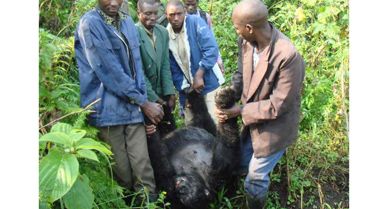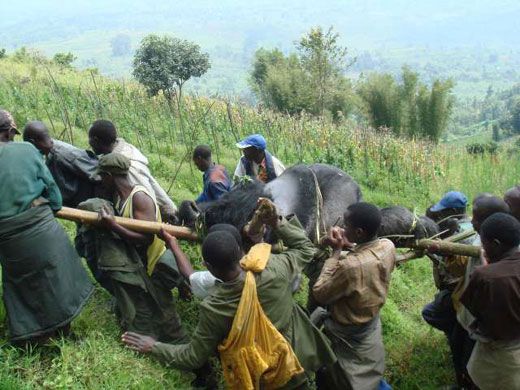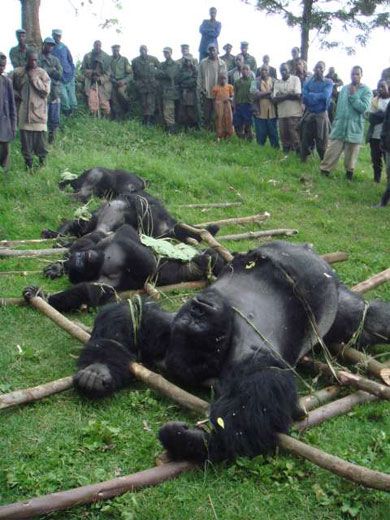State of Emergency
The slaughter of four endangered mountain gorillas in war-ravaged Congo sparks conservationist action
Three female mountain gorillas and one adult silverback were fatally shot on the night of July 22 in Virunga National Park in the Democratic Republic of the Congo.
Last week, five-month-old Ndeze, the baby of one of the slain females, was found by park rangers alive but badly dehydrated and scared.
"It was clearly an incredible moment for everyone concerned," says Robert Muir, project director for the Goma-based Frankfurt Zoological Society's conservation program. "But also extremely sad to see her so traumatized."
Virunga National Park is home to roughly 150 of the world's remaining 700 mountain gorillas, which have a high risk of extinction due to habitat loss, poaching and war.
Ndeze was taken to Goma, where she will be monitored at the Mountain Gorilla Veterinary Project, with hopes of returning her to the wild.
Park rangers believe that the people responsible for the killings are the same people linked to illegal charcoal production in the park.
"They are trying to intimidate wildlife authorities into removing the chief warden, Paulin Ngobobo," Muir says.
Ngobobo has tried to dismantle the illegal charcoal business for the past year and in June received an international award for his efforts, which rangers believe sparked the killings.
Rangers stationed at Virunga's Bukima camp first heard gun shots the night of Sunday, July 22, and entered the forest Monday morning to find three dead female gorillas: Safari, Neza and Mburanumwe.
The following day they found Senkwekwe, the male silverback. Two other gorillas have been missing since the night of the shootings.
The gorillas were part of a family that originally had 12 individuals but now only has five. The lack of females is a major problem for the family's future, Ngobobo wrote on a blog on WildlifeDirect's Web site after the killings.
"It is a disaster that has shaken the global conservation community to its very foundations," Muir says. "We need to get on top of the situation fast, before any more gorillas are killed."
This is not the first execution of its kind in Virunga National Park, which spans the borders of the Democratic Republic of the Congo (DRC), Rwanda and Uganda. Since the beginning of 2007, seven gorillas—1 percent of their total population—have been found dead. The gorillas are listed as critically endangered.
Most of the killings occur from poaching by militias, government soldiers and villagers who rebel against the rangers protecting the park. DRC is ravaged by civil war, which has killed an estimated 4 million people, including 125 park rangers, since its onset in 1994.
In reaction to the latest killings, the Institut Congolais pour la Conservacion de la Nature, with funding from the Frankfurt Zoological Society and conservation group WildlifeDirect, has developed an emergency response plan.
The groups intend to organize gorilla-monitoring teams, set up anti-poaching patrols and make communities and authorities aware of the situation's magnitude.
"Our only hope now to save the gorillas lies in the success of the emergency plan," Muir says. "With the right support from the community and government, there is no reason we should not succeed."
Read more about DRC's mountain gorillas in the October issue of Smithsonian magazine.


